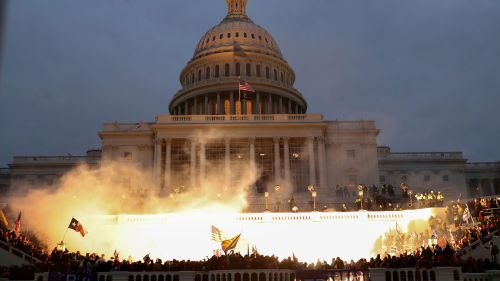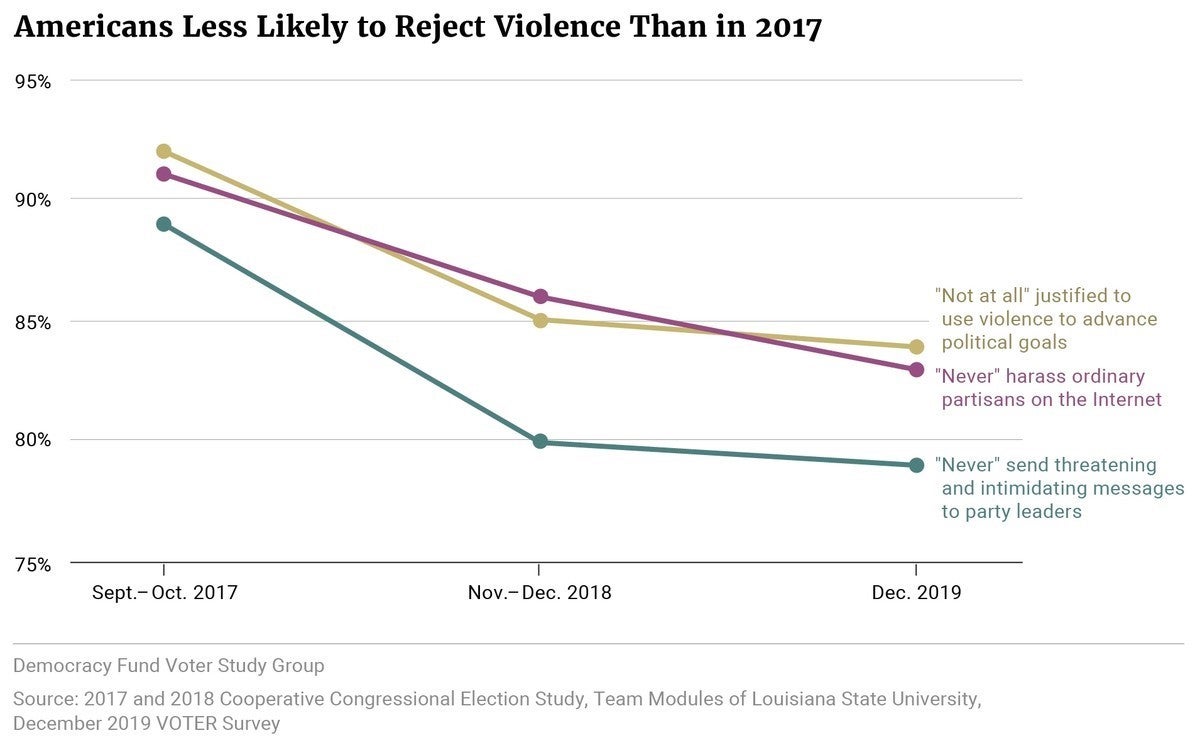Are Americans Willing to Accept Political Violence?

In the aftermath of Jan. 6, some polls show a significant minority support using force to achieve political aims in some circumstances.
Thanks to the revelations emerging from the Jan. 6 committee summer hearings, the specter of political violence in the United States has remained on our public radar. After all, this was the first attempt since the civil war to block the peaceful transfer of power—and it shocked the country and the world. The insurrection also stirred up questions about everyday Americans’ willingness to accept political violence in our society.
Support for Political Violence after the 2020 Elections
Some recent polls have reported what could be considered alarming trends. While a majority of Americans continue to renounce violence, a significant minority support the use of political violence in certain circumstances.
For example, a recently released May 2022 University of Chicago Institute of Politics survey finds that three in 10 Americans agreed that “it may be necessary at some point soon for citizens to take up arms against the government.”
A March 2022 poll commissioned by the Joyce Foundation, Trusted Elections Fund, and the Klarman Family Foundation found that while 56 percent of Americans believe violence is never justified to influence a policy or election, 26 percent say it is almost never justified and 17 percent say it can be justified or is justified in some circumstances. In addition, two in 10 Americans say they know someone who would consider engaging in violence to influence a policy or election in certain circumstances, and 11 percent say they themselves would consider engaging in violence to influence a policy or election.
The political scientists Nathan Kalmoe and Lilliana Mason have been studying attitudes toward political violence since well before the Capitol was actually stormed on Jan. 6. In surveys conducted between 2017 and 2019, about 20 percent of Americans said they would not fully reject the use of violence if their party lost the 2020 presidential election. And results were generally similar for both Democrats and Republicans. The trends that this study has uncovered are also concerning. In just two years, between September 2019 and December 2019, the portion of Americans saying it’s “not at all” justified to use violence to advance political goals dropped 10 points.

In October 2020, the academic consortium Bright Line Watch asked a similar question to find out when, if ever, respondents found it OK to use violence. They found a similar percentage would at least “occasionally” condone violence if the opposing party won the presidential election (23%). While only minorities, these are substantial percentages representing millions of Americans who might be open to the use of violence for political gains.
Partisan Differences
The violence committed on Jan. 6 was brought about by far-right groups like the Proud Boys, the Oath Keepers, and the Three Percenters. While most Americans are not members of extremist groups, the most recent surveys find that Republican Party supporters within the general public are more likely than Democrats or Independents to favor the use of violence (though the majority of Republicans also oppose the use of violence). But Democratic movements and far-left groups like the Weather Underground, the Animal Liberation Front, and the Earth Liberation Front had their day, or decades, in the 1960s–1980s.
There are large differences in partisan motivations for supporting violence. Kalmoe and Mason explain that Democrats tend to support violence “on behalf of inclusive democracy and civic equality,” while Republicans support violence “in defense of the traditional social hierarchy, in which White men retain disproportionate status and power.”
Indeed, Republicans and Democrats may differ in tactics as well. A November 2021 survey conducted by Bright Line Watch found that Democrats are more supportive than Republicans of using nonviolent misdemeanors and nonviolent felonies to advance their political goals (this could, for example, include property damage but was not included in survey question). Republicans are more supportive of threats and violence if the other party wins the 2024 election.
Are the Results Overstated?
Given the high stakes on this issue, several researchers have weighed in on the data and believe these levels of support are inflated. In particular, they called out the question wording in Kalmoe and Mason’s work for being too vague in not defining violence in concrete terms; for response options that might lead respondents to support violence; and for the inclusion of inattentive respondents in the analysis which may have driven up support for violence. In a survey that addressed some of these shortcomings in the poll design, Bright Line Watch took another swing at quantifying support for political aggression and found much lower levels condoning violent behavior. For example, with these changes, only 4 percent of Americans supported using violence if the other party wins the 2024 election. The Bright Line Watch authors note that Kalmoe and Mason also incorporated some changes in their [at that point] forthcoming book and found more moderate support for political violence.
The adjusted results give some personal comfort since the percentage of American who support the use of political violence decreases to single digits. But while these numbers are smaller, they still represent A LOT of people—many more than actually took part in the Jan. 6 insurrection.
Despite the Jan. 6 committee’s strong presentation of the events surrounding the insurrection, only about a third of Americans are following the hearings somewhat or very closely (34%). So far 842 suspects have been charged for their part on Jan. 6. This represents a tiny fraction of the people who voted for Donald Trump in 2020 and look at what they nearly achieved. The majority of Americans still oppose political violence. But while there may be strength in numbers, it turns out it doesn’t take that many people to attempt a coup and disrupt the peaceful transfer of power.

